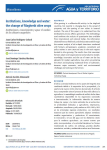Rodríguez-Cohard J.C., Sánchez-Martínez J.D., Garrido-Almonacid A. (2025). Institutions, knowledge and water: the change of Maghrebi olive crops. Agua y Territorio, 10/04/2025, n. 26, p. 201-219.
https://doi.org/10.17561/at.26.8491
https://doi.org/10.17561/at.26.8491
| Titre : | Institutions, knowledge and water: the change of Maghrebi olive crops (2025) |
| Auteurs : | J.C. Rodríguez-Cohard ; J.D. Sánchez-Martínez ; A. Garrido-Almonacid |
| Type de document : | Article |
| Dans : | Agua y Territorio (n. 26, April 2025) |
| Article en page(s) : | p. 201-219 |
| Langues : | Anglais |
| Langues du résumé : | Anglais |
| Catégories : |
Catégories principales 06 - AGRICULTURE. FORÊTS. PÊCHES ; 6.4 - Production Agricole. Système de ProductionThésaurus IAMM SYSTEME DE PRODUCTION ; OLEICULTURE ; GESTION DES EAUX ; UTILISATION DE L'EAU ; AFRIQUE DU NORD |
| Résumé : | Olive growing is a millennia-old activity in the Maghreb countries, but recently is changing due to the spread of prosperity and the opening of new niches in internal markets. The aim of this paper is to understand how the development process affects agriculture. The methodology used combines the analysis of quantitative data available from international and national bodies, the information obtained from our fieldwork, and the data extracted through the content analysis of 60 in-depth interviews conducted with farmers, entrepreneurs, academics, consultants and policy makers in 2019, 2020 and 2022 in the main regions devoted to olive growing. The results show that newcomer farmers adopt novel organizational and productive models. Knowledge, innovation and the use of water are the key elements for modern agriculture. New actors are entering the sector and displacing traditional forms of cultivation. However major economic, social and environmental challenges are looming on the horizon. |
| Cote : | En ligne |
| URL / DOI : | https://doi.org/10.17561/at.26.8491 |







